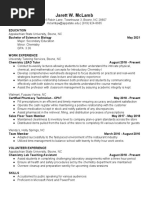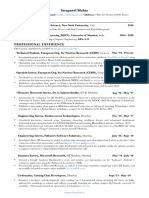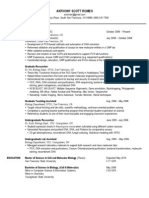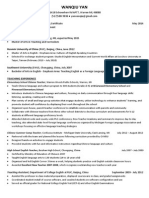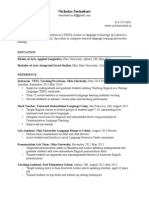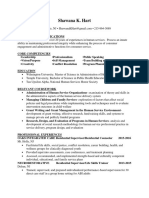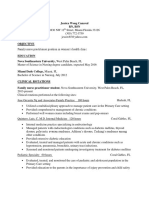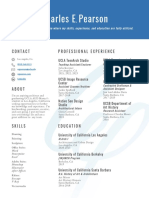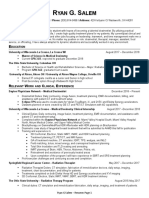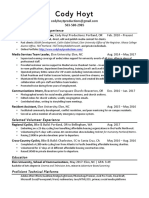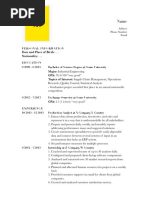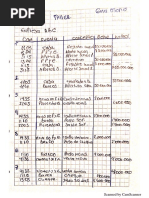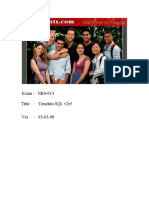Philip Guo CV
Philip Guo CV
Uploaded by
Gina OsorioCopyright:
Available Formats
Philip Guo CV
Philip Guo CV
Uploaded by
Gina OsorioOriginal Description:
Original Title
Copyright
Available Formats
Share this document
Did you find this document useful?
Is this content inappropriate?
Copyright:
Available Formats
Philip Guo CV
Philip Guo CV
Uploaded by
Gina OsorioCopyright:
Available Formats
Philip Guo
Assistant Professor Updated: September 14, 2017
Department of Cognitive Science Email: philip@pgbovine.net
University of California, San Diego (UCSD) www.pgbovine.net
RESEARCH INTERESTS
Human-computer interaction, online learning, productivity tools for programmers and
data scientists, computing education
ACADEMIC POSITIONS
07/2016 – University of California, San Diego (UCSD), La Jolla, CA
Assistant Professor of Cognitive Science
Affiliate Assistant Professor of Computer Science and Engineering
07/2014 – 06/2016 University of Rochester, Rochester, NY
Assistant Professor of Computer Science (2014–2016)
Research Assistant Professor of Computer Science (2016–present)
EDUCATION
09/2006 – 06/2012 Stanford University, Stanford, CA
Ph.D. in Computer Science
Dissertation: Software Tools to Facilitate Research Programming
Advisor: Dawson Engler
06/2005 – 06/2006 Massachusetts Institute of Technology, Cambridge, MA
Master of Engineering in Electrical Engineering and Computer Science
Master’s Thesis: A Scalable Mixed-Level Approach to Dynamic Analysis of C and
C++ Programs, Advisor: Michael D. Ernst
(MIT EECS award for Outstanding Computer Science Master of Engineering Thesis)
09/2001 – 06/2005 Massachusetts Institute of Technology, Cambridge, MA
Bachelor of Science in Electrical Engineering and Computer Science, GPA: 5.0/5.0
AWARDS AND HONORS
10/2017 UIST Honorable Mention Paper Award [C.36]
05/2017 CHI Honorable Mention Paper Award [C.31]
08/2015 Google Faculty Research Award
04/2014 CHI Honorable Mention Paper Award [C.18]
06/2012 ICSE Software Engineering In Practice Best Paper Award [C.13]
07/2009 ACM SIGSOFT Distinguished Paper Award [C.6]
04/2009 CHI Honorable Mention Paper Award [C.3]
09/2009 – 06/2011 National Science Foundation (NSF) Graduate Fellowship
09/2006 – 09/2009 National Defense Science and Engineering (NDSEG) Graduate Fellowship
Philip Guo – Page 1 of 11 – Curriculum Vitae
05/2006 MIT Charles and Jennifer Johnson Thesis Award for Outstanding Computer Science
Master of Engineering Thesis
PRIOR EMPLOYMENT
07/2015 – 08/2015 Microsoft Research, Redmond, WA
Visiting Researcher – Research in Software Engineering (RiSE) group
10/2013 – 06/2014 Massachusetts Institute of Technology, Cambridge, MA
Postdoctoral Researcher – CSAIL User Interface Design Group – Host: Rob Miller
06/2013 – 09/2013 edX, Cambridge, MA
Visiting Research Scientist – analyzed MOOC data [C.15, C.16, C.17]
07/2012 – 02/2013 Google, Mountain View, CA
Software Engineer – online education group – Google Research
09/2006 – 06/2012 Stanford University, Stanford, CA
Ph.D. Student – Department of Computer Science
09/2011 – 01/2012 Harvard University, Cambridge, MA
Visiting Research Fellow – Computer Systems Group – Host: Margo Seltzer
06/2011 – 09/2011 Google, Mountain View, CA
Software Engineering Intern – refined and deployed CDE [C.9, C.12, M.2, B.2]
06/2009 – 09/2009 Microsoft Research, Redmond, WA
Research Intern – Research in Software Engineering (RiSE) group
06/2007 – 09/2007 Google, Mountain View, CA
Software Engineering Intern – prototyped memory allocators for C and C++ programs
01/2004 – 06/2006 Massachusetts Institute of Technology, Cambridge, MA
Research Assistant – Program Analysis Group – Advisor: Michael D. Ernst
Undergraduate and master’s research on tools for analyzing C and C++ programs
09/2003 – 01/2004 Massachusetts Institute of Technology, Cambridge, MA
Research Assistant – Computer Graphics Group – Advisor: Fredo Durand
Developed an HDR (high dynamic range) image editing tool for photographers
06/2004 – 08/2004, Teradyne, Agoura Hills, CA
06/2003 – 08/2003 Software Engineering Intern – wrote simulators for semiconductor test hardware
09/2002 – 06/2003 Massachusetts Institute of Technology, Cambridge, MA
Research Assistant – Teacher Education Program – Advisor: Eric Klopfer
Developed a suite of 5 educational games for Palm OS devices
06/2002 – 08/2002 Codehost, Culver City, CA
Software Engineering Intern – wrote embedded Linux tablet PC software
Philip Guo – Page 2 of 11 – Curriculum Vitae
FUNDING
National Science Foundation. NRT-IGE: Augmenting, Piloting, and Scaling Com-
putational Notebooks to Train New Graduate Researchers in Data-Centric Program-
ming. $498,751 (co-PI, 2017–2020. PI: James Hollan, co-PI: Philip Guo, co-PI: Scott
Klemmer, co-PI: Bradley Voytek)
National Science Foundation. CRII: CHS: Scaling Up Online Peer Tutoring of Com-
puter Programming. $175,000 (sole PI, 2015–2018)
NSF CRII REU (Research Experiences for Undergraduates) supplement. $32,000
Google Faculty Research Award. Enabling Learners to Create Hierarchical Tutorials
from How-To Videos on YouTube. $64,295 (sole PI, 2015)
University of Rochester. University Research Award: Enabling Fast and Scalable
Feedback on Writing. $50,000 (sole PI, 2015)
Microsoft Research. Online Python Tutor for Office Mix. $61,308 (sole PI, 2014)
PEER-REVIEWED PUBLICATIONS
Note that in many areas within computer science and human-computer interaction,
conferences (not journals) are the primary venues for peer-reviewed publications.
Conference C.36 Xiong Zhang and Philip J. Guo. DS.js: Turn Any Webpage into an Example-
Papers Centric Live Programming Environment for Learning Data Science. In Pro-
ceedings of UIST 2017: ACM Symposium on User Interface Software and Tech-
nology, Oct 2017.
(Honorable Mention Paper Award)
C.35 Hyeonsu Kang and Philip J. Guo. Omnicode: A Novice-Oriented Live Pro-
gramming Environment with Always-On Run-Time Value Visualizations. In
Proceedings of UIST 2017: ACM Symposium on User Interface Software and
Technology, Oct 2017.
C.34 Alok Mysore and Philip J. Guo. Torta: Generating Mixed-Media GUI and
Command-Line App Tutorials Using Operating-System-Wide Activity Tracing.
In Proceedings of UIST 2017: ACM Symposium on User Interface Software and
Technology, Oct 2017.
C.33 Ian Drosos, Philip J. Guo, Chris Parnin. HappyFace: Identifying and Predicting
Frustrating Obstacles for Learning Programming at Scale. In Proceedings of
VL/HCC 2017: IEEE Symposium on Visual Languages and Human-Centric
Computing, Oct 2017.
C.32 Jeremy Warner and Philip J. Guo. Hack.edu: Examining How College Hackathons
Are Perceived By Student Attendees and Non-Attendees. In Proceedings of
ICER 2017: ACM International Computing Education Research conference,
August 2017.
C.31 Philip J. Guo. Older Adults Learning Computer Programming: Motivations,
Frustrations, and Design Opportunities. In Proceedings of CHI 2017: ACM
Conference on Human Factors in Computing Systems, May 2017.
(Honorable Mention Paper Award)
Philip Guo – Page 3 of 11 – Curriculum Vitae
C.30 Jeremy Warner and Philip J. Guo. CodePilot: Scaffolding End-to-End Collab-
orative Software Development for Novice Programmers. In Proceedings of CHI
2017: ACM Conference on Human Factors in Computing Systems, May 2017.
C.29 Denae Ford, Justin Smith, Philip J. Guo, Chris Parnin. Paradise Unplugged:
Identifying Barriers for Female Participation on Stack Overflow. In Proceedings
of FSE 2016: ACM SIGSOFT International Symposium on the Foundations of
Software Engineering, Nov 2016.
C.28 Parmit K. Chilana, Rishabh Singh, Philip J. Guo. Understanding Conversa-
tional Programmers: A Perspective from the Software Industry. In Proceedings
of CHI 2016: ACM Conference on Human Factors in Computing Systems, May
2016.
C.27 Philip J. Guo. Codeopticon: Real-Time, One-To-Many Human Tutoring for
Computer Programming. In Proceedings of UIST 2015: ACM Symposium on
User Interface Software and Technology, Nov 2015.
C.26 Philip J. Guo, Jeffery White, Renan Zanelatto. Codechella: Multi-User Pro-
gram Visualizations for Real-Time Tutoring and Collaborative Learning. In
Proceedings of VL/HCC 2015: IEEE Symposium on Visual Languages and
Human-Centric Computing, Oct 2015.
C.25 Mitchell Gordon and Philip J. Guo. Codepourri: Creating Visual Coding Tuto-
rials Using A Volunteer Crowd Of Learners. In Proceedings of VL/HCC 2015:
IEEE Symposium on Visual Languages and Human-Centric Computing, Oct
2015.
C.24 Joyce Zhu, Jeremy Warner, Mitchell Gordon, Jeffery White, Renan Zanelatto,
Philip J. Guo. Toward a Domain-Specific Visual Discussion Forum for Learn-
ing Computer Programming: An Empirical Study of a Popular MOOC Forum.
In Proceedings of VL/HCC 2015: IEEE Symposium on Visual Languages and
Human-Centric Computing, Oct 2015.
C.23 Parmit K. Chilana, Celena Alcock, Shruti Dembla, Anson Ho, Ada Hurst, Brett
Armstrong, Philip J. Guo. Perceptions of Non-CS Majors in Intro Program-
ming: The Rise of the Conversational Programmer. In Proceedings of VL/HCC
2015: IEEE Symposium on Visual Languages and Human-Centric Computing,
Oct 2015.
C.22 Jeremy Warner, John Doorenbos, Bradley N. Miller, Philip J. Guo. How High
School, College, and Online Students Differentially Engage with an Interactive
Digital Textbook. Short paper in Proceedings of EDM 2015: International
Conference on Educational Data Mining, June 2015.
C.21 Carrie J. Cai, Philip J. Guo, James Glass, Robert C. Miller. Wait-Learning:
Leveraging Wait Time for Second Language Education. In Proceedings of CHI
2015: ACM Conference on Human Factors in Computing Systems, April 2015.
C.20 Juho Kim, Philip J. Guo, Carrie J. Cai, Shang-Wen (Daniel) Li, Krzysztof
Z. Gajos, Robert C. Miller. Data-Driven Interaction Techniques for Improv-
ing Navigation of Educational Videos. In Proceedings of UIST 2014: ACM
Symposium on User Interface Software and Technology, October 2014.
C.19 Jeremy Scott, Philip J. Guo, Randall Davis. A Direct Manipulation Language
for Explaining Algorithms. Short paper in Proceedings of VL/HCC 2014: IEEE
Symposium on Visual Languages and Human-Centric Computing, Jul 2014.
Philip Guo – Page 4 of 11 – Curriculum Vitae
C.18 Juho Kim, Phu Nguyen, Sarah Weir, Philip J. Guo, Robert C. Miller, Krzysztof
Z. Gajos. Crowdsourcing Step-by-Step Information Extraction to Enhance
Existing How-to Videos. In Proceedings of CHI 2014: ACM Conference on
Human Factors in Computing Systems, April 2014.
(Honorable Mention Paper Award)
C.17 Philip J. Guo and Katharina Reinecke. Demographic Differences in How Stu-
dents Navigate Through MOOCs. In Proceedings of L@S 2014: ACM Confer-
ence on Learning at Scale, March 2014.
C.16 Philip J. Guo, Juho Kim, Rob Rubin. How Video Production Affects Student
Engagement: An Empirical Study of MOOC Videos. In Proceedings of L@S
2014: ACM Conference on Learning at Scale, March 2014.
C.15 Juho Kim, Philip J. Guo, Daniel T. Seaton, Piotr Mitros, Krzysztof Z. Gajos,
Robert C. Miller. Understanding In-Video Dropouts and Interaction Peaks
in Online Lecture Videos. In Proceedings of L@S 2014: ACM Conference on
Learning at Scale, March 2014.
C.14 Philip J. Guo. Online Python Tutor: Embeddable Web-Based Program Visu-
alization for CS Education. In Proceedings of SIGCSE 2013: ACM Technical
Symposium on Computer Science Education, March 2013.
C.13 Thomas Zimmermann, Nachiappan Nagappan, Philip J. Guo, Brendan Murphy.
Characterizing and Predicting Which Bugs Get Reopened. In Proceedings of
ICSE 2012: ACM/IEEE International Conference on Software Engineering,
Software Engineering In Practice track, June 2012.
(Best Paper Award)
C.12 Philip J. Guo. CDE: Run Any Linux Application On-Demand Without In-
stallation. In Proceedings of LISA 2011: USENIX Large Installation System
Administration Conference, December 2011.
C.11 Philip J. Guo, Sean Kandel, Joseph M. Hellerstein, Jeffrey Heer. Proactive
Wrangling: Mixed-Initiative End-User Programming of Data Transformation
Scripts. In Proceedings of UIST 2011: ACM Symposium on User Interface
Software and Technology, October 2011.
C.10 Philip J. Guo and Dawson Engler. Using Automatic Persistent Memoization
to Facilitate Data Analysis Scripting. In Proceedings of ISSTA 2011: ACM
International Symposium on Software Testing and Analysis, July 2011.
C.9 Philip J. Guo and Dawson Engler. CDE: Using System Call Interposition to
Automatically Create Portable Software Packages. Short paper in Proceedings
of USENIX 2011: USENIX Annual Technical Conference, June 2011.
C.8 Philip J. Guo, Thomas Zimmermann, Nachiappan Nagappan, Brendan Murphy.
“Not My Bug!” and Other Reasons for Software Bug Report Reassignments.
In Proceedings of CSCW 2011: ACM Conference on Computer Supported Co-
operative Work, March 2011.
C.7 Philip J. Guo, Thomas Zimmermann, Nachiappan Nagappan, Brendan Murphy.
Characterizing and Predicting Which Bugs Get Fixed: An Empirical Study of
Microsoft Windows. In Proceedings of ICSE 2010: ACM/IEEE International
Conference on Software Engineering, May 2010.
C.6 Adam Kiezun, Vijay Ganesh, Philip J. Guo, Pieter Hooimeijer, Michael D.
Ernst. HAMPI: A Solver for String Constraints. In Proceedings of ISSTA:
Philip Guo – Page 5 of 11 – Curriculum Vitae
ACM International Symposium on Software Testing and Analysis, July 2009.
(ACM SIGSOFT Distinguished Paper Award)
C.5 Philip J. Guo and Dawson Engler. Linux Kernel Developer Responses to Static
Analysis Bug Reports. Short paper in Proceedings of USENIX 2009: USENIX
Annual Technical Conference, June 2009.
C.4 Adam Kiezun, Philip J. Guo, Karthick Jayaraman, Michael D. Ernst. Auto-
matic Creation of SQL Injection and Cross-site Scripting Attacks. In Proceed-
ings of ICSE 2009: ACM/IEEE International Conference on Software Engi-
neering, May 2009.
C.3 Joel Brandt, Philip J. Guo, Joel Lewenstein, Mira Dontcheva, Scott R. Klem-
mer. Two Studies of Opportunistic Programming: Interleaving Web Foraging,
Learning, and Writing Code. In Proceedings of CHI 2009: ACM Conference
on Human Factors in Computing Systems, April 2009.
(Honorable Mention Paper Award)
C.2 Philip J. Guo, Jeff H. Perkins, Stephen McCamant, Michael D. Ernst. Dy-
namic Inference of Abstract Types. In Proceedings of ISSTA 2006: ACM
International Symposium on Software Testing and Analysis, July 2006.
C.1 Brian Demsky, Michael D. Ernst, Philip J. Guo, Stephen McCamant, Jeff H.
Perkins, Martin Rinard. Automatic Inference and Enforcement of Data Struc-
ture Consistency Specifications. In Proceedings of ISSTA 2006: ACM Interna-
tional Symposium on Software Testing and Analysis, July 2006.
Journal J.3 Elena L. Glassman, Jeremy Scott, Rishabh Singh, Philip J. Guo, Robert C.
Articles Miller. OverCode: Visualizing Variation in Student Solutions to Programming
Problems at Scale. In TOCHI: ACM Transactions on Computer-Human Inter-
action, 2015.
J.2 Adam Kiezun, Vijay Ganesh, Shay Artzi, Philip J. Guo, Pieter Hooimeijer,
Michael D. Ernst. Hampi: A Solver for Word Equations over Strings, Regular
Expressions and Context-free Grammars. In TOSEM: ACM Transactions on
Software Engineering Methodology, 2012.
J.1 Michael D. Ernst, Jeff H. Perkins, Philip J. Guo, Stephen McCamant, Carlos
Pacheco, Matthew S. Tschantz, Chen Xiao. The Daikon system for dynamic
detection of likely invariants. In Science of Computer Programming, 2007.
Workshop W.4 Philip J. Guo and Margo Seltzer. Burrito: Wrapping Your Lab Notebook in
Papers Computational Infrastructure. In Proceedings of TaPP 2012: USENIX Work-
shop on the Theory and Practice of Provenance, June 2012.
W.3 Philip J. Guo. Sloppy Python: Using Dynamic Analysis to Automatically Add
Error Tolerance to Ad-Hoc Data Processing Scripts. In Proceedings of WODA
2011: ACM International Workshop on Dynamic Analysis, July 2011.
W.2 Philip J. Guo and Dawson Engler. Towards Practical Incremental Recompu-
tation for Scientists: An Implementation for the Python Language. In Pro-
ceedings of TaPP 2010: USENIX Workshop on the Theory and Practice of
Provenance, February 2010.
W.1 Joel Brandt, Philip J. Guo, Joel Lewenstein, Scott R. Klemmer. Opportunistic
Programming: How Rapid Ideation and Prototyping Occur in Practice. In
WEUSE 2008: ACM Workshop on End-User Software Engineering, May 2008.
Philip Guo – Page 6 of 11 – Curriculum Vitae
Posters and P.3 Elena L. Glassman, Jeremy Scott, Rishabh Singh, Philip J. Guo, Robert C.
Works-in- Miller. OverCode: Visualizing Variation in Student Solutions to Programming
Progress Problems at Scale. Poster in Proceedings of UIST 2014: ACM Symposium on
User Interface Software and Technology, October 2014.
P.2 Carrie J. Cai, Philip J. Guo, James Glass, Robert C. Miller. Wait-Learning:
Leveraging Conversational Dead Time for Second Language Education. In
Proceedings of CHI 2014: ACM Conference on Human Factors in Computing
Systems, April 2014.
P.1 Anvisha Pai, Philip J. Guo, Robert C. Miller. Modeling Programming Knowl-
edge for Mentoring at Scale. In Proceedings of L@S 2014: ACM Conference
on Learning at Scale, March 2014.
INVITED PUBLICATIONS
Magazine M.11 Philip J. Guo. How adults ages 60+ are learning to code. In Communications
Articles of the ACM, Vol. 60, No. 8, Aug 2017.
M.10 Philip J. Guo. Learning Programming at Scale. In O’Reilly Radar, Aug 2015.
M.9 Philip J. Guo. Refining Students’ Coding and Reviewing Skills. In Communi-
cations of the ACM, Vol. 57, No. 9, Sep 2014.
M.8 Philip J. Guo. The Difficulty of Teaching Programming Languages, and the
Benefits of Hands-on Learning. In Communications of the ACM, Vol. 57, No.
7, Jul 2014. (appeared alongside an unrelated article by Mark Guzdial)
M.7 Philip J. Guo. Clarifying Human-Computer Interaction. In Communications
of the ACM, Vol. 57, No. 2, Feb 2014.
M.6 Philip J. Guo. Silent Technical Privilege. In Slate, Jan 2014.
M.5 Philip J. Guo. Helping scientists, engineers to work up to 100 times faster. In
Communications of the ACM, Vol. 56, No. 10, Oct 2013.
M.4 Philip J. Guo. Teaching Programming the Way It Works Outside the Class-
room. In Communications of the ACM, Vol. 56, No. 8, Aug 2013.
M.3 Philip J. Guo. Lessons from the Grind: How unglamorous grunt work can lead
to creative innovation. In MIT Technology Review, Jan 2013.
M.2 Philip J. Guo. CDE: A Tool For Creating Portable Experimental Software
Packages. In Computing in Science and Engineering: Special Issue on Software
for Reproducible Computational Science, Jul/Aug 2012.
M.1 Joel Brandt, Philip J. Guo, Joel Lewenstein, Mira Dontcheva, Scott R. Klem-
mer. Opportunistic Programming: Writing Code to Prototype, Ideate, and
Discover. In IEEE Software: Special Issue on End-User Software Engineering,
Sep/Oct 2009.
Book B.3 Philip J. Guo. Parse that data! Practical Tips for preparing your raw data
Chapters for analysis. Book chapter in Perspectives on Data Science for Software En-
gineering, T. Menzies, L. Williams, T. Zimmermann, eds. Morgan Kaufmann,
2016.
B.2 Philip J. Guo. CDE: Automatically Package and Reproduce Computational
Experiments. Book chapter in Implementing Reproducible Research, V. Stod-
den, F. Leisch, R. Peng, eds. Taylor & Francis Group, 2013.
Philip Guo – Page 7 of 11 – Curriculum Vitae
B.1 Joel Brandt, Philip J. Guo, Joel Lewenstein, Mira Dontcheva, Scott R. Klem-
mer. How the Web Helps People Turn Ideas Into Code. Book chapter in
No Code Required: Giving Users Tools to Transform the Web, A. Cypher, M.
Dontcheva, T. Lau, J. Nichols, eds. Morgan Kaufmann, 2010.
Invited IP.1 Quanzeng You, Jianbo Yuan, Jiaqi Wang, Philip J. Guo, Jiebo Luo. Snap
Papers n’ Shop: Visual Search-Based Mobile Shopping Made a Breeze by Machine
and Crowd Intelligence. In Proceedings of ICSC 2015: IEEE International
Conference on Semantic Computing, Feb 2015.
INVITED TALKS
• The Design Space of Tools for Learning Programming at Scale
UCSD Design at Large Seminar, October 2016.
• Interactive Systems for Learning Programming at Scale
(faculty candidate job talk)
Northwestern University EECS and School of Education and Social Policy, UCSD
Cognitive Science, CU Boulder CS, Yale University CS, UCLA CS, UC Berkeley
School of Information, UCSD Computer Science & Engineering, Jan–Apr 2016.
• Interactive Systems for Learning Programming at Scale. Stanford Human-Computer
Interaction Seminar, Stanford, CA, Feb 2016; Recurse Center (née Hacker School),
New York, NY, Jan 2016; University of Maryland, College Park, MD, Dec 2015.
• Invited panelist on tools for personalized education, CCC visioning workshop on
Computer-Aided Personalized Education, Washington, D.C., Nov 2015.
• Learning Programming at Scale. University of Rochester Laboratory for Laser
Energetics, Rochester, NY, Sep 2015; Microsoft Research, Redmond, WA, Aug
2015; University of Washington DUB seminar, Seattle, WA, July 2015.
• Online Python Tutor: A 5-Year Retrospective.
Union College, Rensselaer Polytechnic Institute (RPI), New York, Oct 2014.
• How to effectively ask for help as a junior employee.
MIT 6.UAT guest lecture, Cambridge, MA, Nov 2013.
• Hacking the Ph.D.: Three Serendipitous Projects.
Hacker School, New York, NY, Nov 2013.
• Why Pursue A Ph.D.? Three Practical Reasons. Amherst College, UMass Amherst,
Brown, MIT, Harvard, Tufts. Oct–Nov 2013.
• Challenges in Teaching Python Programming: Vocabulary, Meaning, and Idioms.
MIT Lincoln Laboratory, Lexington, MA, Oct 2013.
• Twenty Lessons From The Ph.D. Grind.
Keynote at the MIT CSAIL Student Workshop, Oct 2013.
• Software Tools for Research Programming. Boston University, MA, Sep 2013.
• Programming On Demand: Wrangling, Iterating, and Opportunistic Learning.
(faculty candidate job talk, all in CS or EECS departments)
University of Utah, North Carolina State University, Dartmouth College, Univer-
sity of San Francisco, Oregon State University, Northeastern University, Univer-
sity of Rochester, Washington University in St. Louis, Feb–Mar 2013.
Philip Guo – Page 8 of 11 – Curriculum Vitae
• Online Python Tutor: Web-Based Program Visualization for CS Education. Sonoma
State University – Computer Science Colloquium, Rohnert Park, CA, Nov 2012;
Hacker School, New York, NY, Oct 2012.
• The Ph.D. Grind: Candid Discussions About Ph.D. Life. UC Riverside – Computer
Science Colloquium, Riverside, CA, Oct 2012; Google Tech Talk, Mountain View,
CA, August 2012.
• CDE: automatically creating reproducible experimental software packages. Repro-
ducible Research: Tools and Strategies for Scientific Computing interdisciplinary
meeting, Vancouver, Canada, July 2011; NASA JPL, Pasadena, CA, May 2011.
• CDE: Using System Call Interposition to Automatically Create Portable Software
Packages. Google Tech Talk, Mountain View, CA, Feb 2011.
• The potentials and challenges of implementing automatic test generation using
combined concrete and symbolic execution. Fujitsu, Sunnyvale, CA, Oct 2009.
• Automatic Creation of SQL Injection and Cross-site Scripting Attacks. Samsung
R&D Center, San Jose, CA, May 2009.
SERVICE
Program • L@S 2018 (ACM Conference on Learning at Scale)
Committee • ICER 2017 review committee (Int’l Computing Education Research Conference)
• LIVE 2017 (Workshop on Live Programming, located at SPLASH 2017)
• EDM 2017 (International Conference on Educational Data Mining)
• VISSOFT 2016 (IEEE Working Conference on Software Visualization)
• EDM 2016 (International Conference on Educational Data Mining)
• L@S 2016 (ACM Conference on Learning at Scale)
• L@S 2015 (ACM Conference on Learning at Scale)
• PLOOC 2015 (Workshop on Programming Languages Technology for MOOCs)
• CHESE 2015 (Int’l Code Hunt Workshop on Educational Software Engineering)
• SPLASH-E 2015 (Systems, Programming, Languages and Applications: Software
for Humanity – Education Symposium)
• PLATEAU 2012 (Workshop on Evaluation and Usability of Programming Lan-
guages and Tools)
• TaPP 2012 (Workshop on the Theory and Practice of Provenance)
Paper Reviewer CHI (2014–2017), UIST (2013–2017), CSCW (2014–2018), TOCE (2017–2018), JSME
(2017), JVLC (2016), VLSS (2016), IEEE Software (2016), TOCHI (2015), IUI (2015),
MobileHCI (2015–2016), UbiComp (2015), JAIED (2015, 2017), TSE (2014–2015)
PLDI (2013), EuroSys (2012), POPL (2011), ECOOP (2006, 2009)
Grant Reviewer Sloan Foundation (2012), NSF panel (2016, 2017)
(details omitted for confidentiality)
Artifact Eval. ESEC/FSE 2011 (Symposium on the Foundations of Software Engineering)
Committee
TEACHING
Instructor • UCSD COGS 120/CSE 170: Human-Computer Interaction Design
(Fall 2016, Fall 2017)
• UCSD COGS 124: Human-Computer Interaction Technical Systems Research
(Fall 2017)
Philip Guo – Page 9 of 11 – Curriculum Vitae
• UCSD CSE 219/COGS 229/DSGN 119: Design at Large seminar series
(Fall 2017)
• UCSD COGS 121: Human-Computer Interaction Programming Studio
(Spring 2017)
• UCSD COGS 231: Grad Seminar on Human-Centered Programming
(Spring 2017)
• University of Rochester CSC 210: Principles of Web Application Development
(Fall 2014, Fall 2015)
• University of Rochester CSC 253: Dynamic Languages & Software Development
(Fall 2014)
• MIT 6.813 – User Interface Design & Implementation, co-taught with Rob Miller,
Daniel Jackson, and David Karger (Spring 2014)
Teaching • Stanford CS343 – Advanced Topics in Compilers (Spring 2012)
Assistant • Stanford CS242 – Programming Languages (Autumn 2009)
• Stanford CS243 – Advanced Compiling Techniques (Winter 2008)
• MIT 6.170 – Laboratory in Software Engineering (Spring 2006)
Undergraduate • MIT 6.170 – Laboratory in Software Engineering (Fall 2004)
Laboratory • MIT 6.111 – Introductory Digital Systems Laboratory (Fall 2004)
Assistant • MIT 6.001 – Structure and Interpretation of Computer Programs (Spring 2002)
CURRENT AND FORMER RESEARCH STUDENTS SUPERVISED
Ph.D. • Ian Drosos [C.33]
• Logan Gittelson
• Kandarp Khandwala
• Sean Kross
• Jaime Montoya
• Xiong Zhang [C.36]
Masters • Davide Berdin (visiting student from Uppsala University, Sweden)
• Hsien-che (Charles) Chen – undergrad+masters
• Hyeonsu Kang [C.35]
• Alok Mysore [C.34] – 2017 UCSD CSE masters student research award winner
• Dan Scarafoni – first position: MIT Lincoln Laboratory
• Jeremy Warner [C.22,C.24,C.30,C.32] – undergrad+masters, first position: Ph.D.
student in the UC Berkeley EECS department
• Jeffery White [C.24,C.26]
• Renan Zanelatto [C.24,C.26]
Undergraduate • Karina Banda
• Lenny Brown
• Irene Chen – first position: Google
• Jennifer (Kate) Godzicki
• Mitchell Gordon [C.24,C.25] – 2015 CRA Outstanding Undergraduate Researcher
Award winner, first position: Ph.D. student in the Stanford Computer Science
department
• Dan Hassin
• Sara Lickers
• Emy Lin – first position: Intel
• Douglas Miller – first position: Jump Trading
• Anvisha Pai – first position: Dropbox
• Annie Zhang
Philip Guo – Page 10 of 11 – Curriculum Vitae
• Joyce Zhu [C.24] – 2015 CRA Outstanding Undergraduate Researcher Award hon-
orable mention, first position: Quip
Ph.D. Committee Erin Brady, Anna Loparev, Phyo Thiha, Eric Seidel, Tricia Ngoon, Adam Rule
Member
Outreach@Scale My Python Tutor educational website pythontutor.com has so far accumulated over
3.5 million total users from over 180 countries. My personal website pgbovine.net
contains over 400 articles, videos, and podcast episodes on topics ranging from research
to education, and receives over 750,000 page views per year. My YouTube channel
has over 200 research, education, and outreach videos, over 2,500 subscribers, and
∼300,000 total video views. My Twitter social media account has ∼7,000 followers
and has been officially verified by the company as a notable account of public interest.
Philip Guo – Page 11 of 11 – Curriculum Vitae
You might also like
- Carrie Roche ResumeDocument1 pageCarrie Roche Resumeapi-498084451No ratings yet
- Jarett W. MclambDocument1 pageJarett W. Mclambapi-474635498No ratings yet
- Santosh CVDocument6 pagesSantosh CVYugendra RNo ratings yet
- Hima Lakkaraju CVDocument6 pagesHima Lakkaraju CVShalya ShresthaNo ratings yet
- CVDocument2 pagesCVSoham ParekhNo ratings yet
- Pranav - CV Pranavmistry - Co.ukDocument3 pagesPranav - CV Pranavmistry - Co.ukbhangu7685No ratings yet
- Dhirendra CVDocument2 pagesDhirendra CVDhirendra SinghNo ratings yet
- Abrar Resume May - 2020new PDFDocument1 pageAbrar Resume May - 2020new PDFMohammed MohiuddinNo ratings yet
- Jason Randall ResumeDocument2 pagesJason Randall ResumeJason RandallNo ratings yet
- Jenn Bollenbacher Resume 2010Document2 pagesJenn Bollenbacher Resume 2010jenniferalaineNo ratings yet
- @pradvancedDocument1 page@pradvancednessa_t_ruanoNo ratings yet
- Drazenovich George For WebsiteDocument4 pagesDrazenovich George For Websiteapi-119731502No ratings yet
- Resume Updated 5-16Document3 pagesResume Updated 5-16api-459388377No ratings yet
- CV Valentina Gonzalez 2017-2018Document3 pagesCV Valentina Gonzalez 2017-2018Valentina GonzalezNo ratings yet
- KobayashiTakakoCV September2014Document4 pagesKobayashiTakakoCV September2014Takako Kobame KobayashiNo ratings yet
- Helen Matthews ResuméDocument3 pagesHelen Matthews Resuméhelenmatthews00No ratings yet
- Tiffany Hough ResumeDocument2 pagesTiffany Hough Resumeapi-337710888No ratings yet
- Resume - Molecular Biology - Anthony RomeoDocument1 pageResume - Molecular Biology - Anthony RomeoTony RomeoNo ratings yet
- Melissa Koroleff Resume 2017Document2 pagesMelissa Koroleff Resume 2017api-69490986No ratings yet
- Garrisons Resume 2019-2020Document2 pagesGarrisons Resume 2019-2020api-512576754No ratings yet
- Artifact A2Document3 pagesArtifact A2api-279801888No ratings yet
- Shuai Weis ResumeDocument3 pagesShuai Weis Resumeapi-315333936No ratings yet
- Pinneyk Resume CanDocument2 pagesPinneyk Resume Canapi-251465986No ratings yet
- Yanwanqiu CVDocument2 pagesYanwanqiu CVapi-282938028No ratings yet
- Nicholas Swinehart CVDocument2 pagesNicholas Swinehart CVNick SwinehartNo ratings yet
- Sarah R. Hallinen: TH THDocument2 pagesSarah R. Hallinen: TH THSarahHallinenNo ratings yet
- Tiffany Lewallyn ResumeDocument2 pagesTiffany Lewallyn Resumeapi-584414253No ratings yet
- Resume 4 Feb 2020 Ni 2Document2 pagesResume 4 Feb 2020 Ni 2api-509885032No ratings yet
- Sam Burgin ResumeDocument2 pagesSam Burgin Resumesburgin90No ratings yet
- Sara Westin Resume WeeblyDocument2 pagesSara Westin Resume Weeblyapi-273674062100% (1)
- Tara Barnhill - Elementary ResumeDocument2 pagesTara Barnhill - Elementary Resumeapi-494118478No ratings yet
- Olga Lelyukh ResumeDocument4 pagesOlga Lelyukh Resumeapi-385538873No ratings yet
- Rutishauser CV - AssessmentDocument4 pagesRutishauser CV - Assessmentapi-495126213No ratings yet
- Daniel Welch Resume 2022 - EcoDocument2 pagesDaniel Welch Resume 2022 - Ecoapi-556922417No ratings yet
- WeeblyresDocument1 pageWeeblyresapi-434186843No ratings yet
- Resume WebsiteDocument2 pagesResume Websiteapi-319860340No ratings yet
- Hart K ShawanaDocument2 pagesHart K Shawanaapi-354042166No ratings yet
- Molecular Scientist in San Diego CA Resume Sanja GlisicDocument2 pagesMolecular Scientist in San Diego CA Resume Sanja GlisicSanjaGlisicNo ratings yet
- Resume 2016 GlaserDocument2 pagesResume 2016 Glaserapi-313325321No ratings yet
- Resume 1Document2 pagesResume 1api-469965588No ratings yet
- Resume March 2020Document2 pagesResume March 2020api-509696011No ratings yet
- Danielle Gale Resume WeeblyDocument2 pagesDanielle Gale Resume Weeblyapi-338304178No ratings yet
- CV Jill Bowers 2017Document8 pagesCV Jill Bowers 2017api-347235354No ratings yet
- Curriculum VitaeportDocument3 pagesCurriculum Vitaeportapi-315762618No ratings yet
- Sarah Richmond Resume 2020 PDFDocument6 pagesSarah Richmond Resume 2020 PDFcasey bethNo ratings yet
- Resume/Curriculum Vitae - Susie Mahoney, Ed.D.Document5 pagesResume/Curriculum Vitae - Susie Mahoney, Ed.D.Susie MahoneyNo ratings yet
- Adilenne Espindola ResumeDocument2 pagesAdilenne Espindola Resumeapi-499140792No ratings yet
- Resume EportfolioDocument2 pagesResume Eportfolioapi-337179964No ratings yet
- RSherman ResumeDocument3 pagesRSherman ResumeRachel Sherman100% (1)
- Marco Machado - Physics Teacher Resume 1Document2 pagesMarco Machado - Physics Teacher Resume 1api-455091043No ratings yet
- CV Jennylee FranciscoDocument4 pagesCV Jennylee Franciscoapi-397238352No ratings yet
- Melody Hrebien ResumeDocument1 pageMelody Hrebien Resumeapi-528806268No ratings yet
- 2023 Resume Charles PearsonDocument1 page2023 Resume Charles PearsonCharles PearsonNo ratings yet
- Heidi Marie Dumke (Laidemitt)Document3 pagesHeidi Marie Dumke (Laidemitt)Heidi DumkeNo ratings yet
- Ryansalem ResumeDocument3 pagesRyansalem Resumeapi-385172083No ratings yet
- Cody Hoyt: Selected Professional ExperienceDocument1 pageCody Hoyt: Selected Professional ExperienceCody HoytNo ratings yet
- Devita Bishundat's ResumeDocument2 pagesDevita Bishundat's ResumeDevita BishundatNo ratings yet
- Resume 20190529Document1 pageResume 20190529Christopher DefreitasNo ratings yet
- Date and Place of Birth: . Nationality: .: Address Phone Number EmailDocument2 pagesDate and Place of Birth: . Nationality: .: Address Phone Number EmailAlexandru LucianNo ratings yet
- Greg Nelson CV 2023Document5 pagesGreg Nelson CV 2023Gregory NelsonNo ratings yet
- Taller ContabilidadDocument3 pagesTaller ContabilidadGina OsorioNo ratings yet
- Exercises. Questions in Present Simple 2Document4 pagesExercises. Questions in Present Simple 2Gina OsorioNo ratings yet
- Vendor Information Sheet (VIS)Document6 pagesVendor Information Sheet (VIS)Gina OsorioNo ratings yet
- The National Science Foundation Administration and Management Strategic Plan Executive SummaryDocument3 pagesThe National Science Foundation Administration and Management Strategic Plan Executive SummaryGina OsorioNo ratings yet
- TS236 TS237 enDocument4 pagesTS236 TS237 enGina OsorioNo ratings yet
- QP-XII-CS-SET-1Document9 pagesQP-XII-CS-SET-1rashmee7305No ratings yet
- Monthly INS FormatDocument4 pagesMonthly INS Formatyamuna ANo ratings yet
- 2.6 How To Talk To A ComputerDocument12 pages2.6 How To Talk To A ComputerSyita Nur ImanNo ratings yet
- VB ScriptDocument3 pagesVB Scriptsudha1427No ratings yet
- Computer Project SSDocument55 pagesComputer Project SSAditya SinghNo ratings yet
- ADS 2nd Semester Course OutlinesDocument5 pagesADS 2nd Semester Course OutlinesClaire MarshallNo ratings yet
- Sharanya ThandraDocument41 pagesSharanya ThandraleonardopereiramoraisNo ratings yet
- O Level Computer Science 2210 Pre Release Material Summer 2017Document8 pagesO Level Computer Science 2210 Pre Release Material Summer 2017Shahriar AzgarNo ratings yet
- Exam: NR0-013 Title: Teradata SQL v2r5 Ver: 03-03-08Document37 pagesExam: NR0-013 Title: Teradata SQL v2r5 Ver: 03-03-08Ujwal Narasapur100% (1)
- Access VBA ManualDocument321 pagesAccess VBA ManualGanesh VamsharajNo ratings yet
- 6 - Join Techniques and Performance EvaluationDocument33 pages6 - Join Techniques and Performance EvaluationHamid MahmoodNo ratings yet
- DR - Jyothirmayi Degree College, Adoni.: Paper-III - Object Oriented Programming Using C++: Unit-1 FundamentalsDocument65 pagesDR - Jyothirmayi Degree College, Adoni.: Paper-III - Object Oriented Programming Using C++: Unit-1 FundamentalshafsaadnNo ratings yet
- ServletDocument104 pagesServletLong NguyenNo ratings yet
- Tru64 Unix Programmers GuideDocument514 pagesTru64 Unix Programmers GuideAjayNo ratings yet
- Exception Handling inJAvADocument22 pagesException Handling inJAvAVinayKumarSingh100% (1)
- Lesson 6 (Access Modified, Inheritance, Interface)Document13 pagesLesson 6 (Access Modified, Inheritance, Interface)Abhay tiwariNo ratings yet
- Mona CheatsheetDocument5 pagesMona CheatsheetJulioIglesiasNo ratings yet
- 1.2 Evolution of C++Document9 pages1.2 Evolution of C++anon_724069177No ratings yet
- Vikas Rai: Areer BjectiveDocument2 pagesVikas Rai: Areer BjectiveVikas Rai RajputNo ratings yet
- Program B 14 Selection BubbleDocument3 pagesProgram B 14 Selection BubbleJai JadhavNo ratings yet
- RC Database DevelopmentDocument22 pagesRC Database DevelopmentR CNo ratings yet
- LibDocument2 pagesLibseranobiNo ratings yet
- Computer 10Document25 pagesComputer 10Bipin BhattaNo ratings yet
- CS 241 Data Structures: Dr. Bashir M. GhandiDocument27 pagesCS 241 Data Structures: Dr. Bashir M. GhandiarbazNo ratings yet
- C Program Compilation StepsDocument4 pagesC Program Compilation StepsSarah CummingsNo ratings yet
- Help Excellib ModulDocument25 pagesHelp Excellib ModulPopa MariusNo ratings yet
- Introduction To PHPDocument17 pagesIntroduction To PHPDivyaBharadwajNo ratings yet
- Expanded Description of Fortran 90 / 95 Intrinsic ProceduresDocument36 pagesExpanded Description of Fortran 90 / 95 Intrinsic ProceduresFrancisco Celestino GuajardoNo ratings yet
- Bigo ListDocument8 pagesBigo ListNetriderTheThechieNo ratings yet
- Validation EngineDocument11 pagesValidation Engines_sabcNo ratings yet

